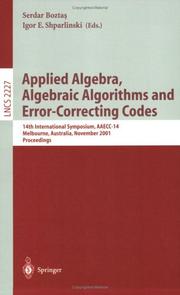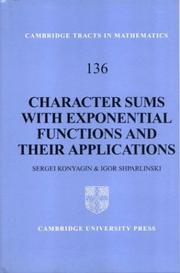| Listing 1 - 7 of 7 |
Sort by
|

ISBN: 0792320573 Year: 1992 Publisher: Dordrecht : Kluwer,
Abstract | Keywords | Export | Availability | Bookmark
 Loading...
Loading...Choose an application
- Reference Manager
- EndNote
- RefWorks (Direct export to RefWorks)

ISBN: 3540429115 3540456244 Year: 2001 Publisher: Berlin, Heidelberg : Springer Berlin Heidelberg : Imprint: Springer,
Abstract | Keywords | Export | Availability | Bookmark
 Loading...
Loading...Choose an application
- Reference Manager
- EndNote
- RefWorks (Direct export to RefWorks)
The AAECC Symposia Series was started in 1983 by Alain Poli (Toulouse), who, together with R. Desq, D. Lazard, and P. Camion, organized the ?rst conference. Originally the acronym AAECC meant “Applied Algebra and Error-Correcting Codes”. Over the years its meaning has shifted to “Applied Algebra, Algebraic Algorithms, and Error-Correcting Codes”, re?ecting the growing importance of complexity in both decoding algorithms and computational algebra. AAECC aims to encourage cross-fertilization between algebraic methods and their applications in computing and communications. The algebraic orientation is towards ?nite ?elds, complexity, polynomials, and graphs. The applications orientation is towards both theoretical and practical error-correction coding, and, since AAECC 13 (Hawaii, 1999), towards cryptography. AAECC was the ?rst symposium with papers connecting Gr¨obner bases with E-C codes. The balance between theoretical and practical is intended to shift regularly; at AAECC-14 the focus was on the theoretical side. The main subjects covered were: – Codes: iterative decoding, decoding methods, block codes, code construction. – Codes and algebra: algebraic curves, Gr¨obner bases, and AG codes. – Algebra: rings and ?elds, polynomials. – Codes and combinatorics: graphs and matrices, designs, arithmetic. – Cryptography. – Computational algebra: algebraic algorithms. – Sequences for communications.
Error-correcting codes (Information theory) --- Algebra --- Algorithms --- Mathematics --- Physical Sciences & Mathematics --- Data processing --- Codes, Error-correcting (Information theory) --- Error-detecting codes (Information theory) --- Forbidden-combination check (Information theory) --- Self-checking codes (Information theory) --- Mathematics. --- Data encryption (Computer science). --- Coding theory. --- Algorithms. --- Computer science --- Algebra. --- Computer mathematics. --- Coding and Information Theory. --- Symbolic and Algebraic Manipulation. --- Data Encryption. --- Algorithm Analysis and Problem Complexity. --- Computational Mathematics and Numerical Analysis. --- Artificial intelligence --- Automatic control --- Coding theory --- Information theory --- Computer software. --- Cryptology. --- Data processing. --- Computer mathematics --- Discrete mathematics --- Electronic data processing --- Software, Computer --- Computer systems --- Data encoding (Computer science) --- Encryption of data (Computer science) --- Computer security --- Cryptography --- Data compression (Telecommunication) --- Digital electronics --- Machine theory --- Signal theory (Telecommunication) --- Computer programming --- Mathematical analysis --- Information theory. --- Computer science—Mathematics. --- Algorism --- Arithmetic --- Communication theory --- Communication --- Cybernetics --- Foundations

ISBN: 110712817X 1280432454 9786610432455 0511177631 0511040369 0511148046 0511330170 0511542933 0511051794 9780511040368 9780511051791 9780521642637 0521642639 0521642639 9780511542930 Year: 1999 Volume: 132 Publisher: Cambridge Cambridge University Press
Abstract | Keywords | Export | Availability | Bookmark
 Loading...
Loading...Choose an application
- Reference Manager
- EndNote
- RefWorks (Direct export to RefWorks)
The theme of this book is the study of the distribution of integer powers modulo a prime number. It provides numerous new, sometimes quite unexpected, links between number theory and computer science as well as to other areas of mathematics. Possible applications include (but are not limited to) complexity theory, random number generation, cryptography, and coding theory. The main method discussed is based on bounds of exponential sums. Accordingly, the book contains many estimates of such sums, including new estimates of classical Gaussian sums. It also contains many open questions and proposals for further research.
Exponential sums. --- Sums, Exponential --- Numerical functions --- Sequences (Mathematics) --- Exponential sums
Book

ISBN: 9783110283600 3110283603 1299723578 9781299723573 9783110282405 3110282402 Year: 2013 Publisher: Berlin Boston
Abstract | Keywords | Export | Availability | Bookmark
 Loading...
Loading...Choose an application
- Reference Manager
- EndNote
- RefWorks (Direct export to RefWorks)
Digital

ISBN: 9783110283600 9783110282405 Year: 2013 Publisher: Berlin ;; Boston De Gruyter
Abstract | Keywords | Export | Availability | Bookmark
 Loading...
Loading...Choose an application
- Reference Manager
- EndNote
- RefWorks (Direct export to RefWorks)
Book

ISBN: 1282102516 9786612102516 3110208504 9783110208504 3110202212 9783110202212 Year: 2009 Publisher: Berlin Boston
Abstract | Keywords | Export | Availability | Bookmark
 Loading...
Loading...Choose an application
- Reference Manager
- EndNote
- RefWorks (Direct export to RefWorks)
This volume contains selected refereed papers based on lectures presented at the 'Integers Conference 2007', an international conference in combinatorial number theory that was held in Carrollton, Georgia in October 2007. The proceedings include contributions from many distinguished speakers, including George Andrews, Neil Hindman, Florian Luca, Carl Pomerance, Ken Ono and Igor E. Shparlinski. Among the topics considered in these papers are additive number theory, multiplicative number theory, sequences, elementary number theory, theory of partitions, and Ramsey theory.
Combinatorial number theory --- Number theory --- Combinatorial analysis --- Additive Number Theory. --- Combinatorial Game Theory. --- Hypergraphs. --- Multiplicative Number Theory. --- Probabilistic Number Theory. --- Ramsey Theory.
Digital

ISBN: 9783110208504 9783110202212 Year: 2009 Publisher: Berlin ;; Boston De Gruyter
Abstract | Keywords | Export | Availability | Bookmark
 Loading...
Loading...Choose an application
- Reference Manager
- EndNote
- RefWorks (Direct export to RefWorks)
| Listing 1 - 7 of 7 |
Sort by
|

 Search
Search Feedback
Feedback About UniCat
About UniCat  Help
Help News
News